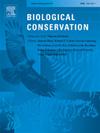Vaccination of endangered wildlife as a conservation tool: Hindsights and new horizons in the pandemic era
IF 4.9
1区 环境科学与生态学
Q1 BIODIVERSITY CONSERVATION
引用次数: 0
Abstract
Vaccines are an established conservation tool that can reduce the threat of infectious disease in endangered wildlife populations. Vaccines exist for many infectious pathogens, and at a time of rapid technological advances in vaccinology, developing vaccines and vaccination programs for free-living endangered wildlife could help efforts to prevent extinctions from disease threats. Vaccination efforts could focus on protecting members of the target species or could be directed at reservoir populations to prevent pathogen spillover. Vaccination strategies need to be substantiated by research on safety and effectiveness, include risk and feasibility assessments, account for differences in host biology and disease epidemiology, and align with relevant regulatory frameworks. Engagement with stakeholders and the public is important to ensure the success of endangered species vaccination programs. Challenges such as funding, regulation, and societal acceptance are barriers to progress in vaccination programs for some species and geographic regions. We recommend the development of scientifically based international guidelines and a transdisciplinary forum with a specific emphasis on endangered wildlife vaccination. New technologies could be used collaboratively to prevent transmission of diseases for which vaccines are not currently available. Careful approaches and enhanced collaborations could help ensure the successful development of wildlife vaccination programs and promote resilience of endangered wildlife populations to increasing anthropogenic and environmental stressors on biodiversity.
将濒危野生动物疫苗接种作为一种保护工具:大流行病时代的后见之明和新视野
疫苗是一种成熟的保护工具,可以减少传染病对濒危野生动物种群的威胁。在疫苗学技术飞速发展的今天,为自由生活的濒危野生动物开发疫苗和疫苗接种计划有助于防止疾病威胁造成的物种灭绝。疫苗接种工作可以侧重于保护目标物种的成员,也可以针对蓄养种群以防止病原体外溢。疫苗接种策略需要得到安全性和有效性研究的证实,包括风险和可行性评估,考虑宿主生物学和疾病流行病学的差异,并与相关监管框架保持一致。利益相关者和公众的参与对于确保濒危物种疫苗接种计划的成功非常重要。资金、监管和社会接受度等挑战阻碍了某些物种和地理区域疫苗接种计划的进展。我们建议制定以科学为基础的国际指南,并建立一个跨学科论坛,特别强调濒危野生动物疫苗接种。可以合作使用新技术来预防目前还没有疫苗的疾病的传播。谨慎的方法和加强合作有助于确保野生动物疫苗接种计划的成功制定,并促进濒危野生动物种群抵御生物多样性所面临的日益增加的人为和环境压力。
本文章由计算机程序翻译,如有差异,请以英文原文为准。
求助全文
约1分钟内获得全文
求助全文
来源期刊

Biological Conservation
环境科学-环境科学
CiteScore
10.20
自引率
3.40%
发文量
295
审稿时长
61 days
期刊介绍:
Biological Conservation is an international leading journal in the discipline of conservation biology. The journal publishes articles spanning a diverse range of fields that contribute to the biological, sociological, and economic dimensions of conservation and natural resource management. The primary aim of Biological Conservation is the publication of high-quality papers that advance the science and practice of conservation, or which demonstrate the application of conservation principles for natural resource management and policy. Therefore it will be of interest to a broad international readership.
 求助内容:
求助内容: 应助结果提醒方式:
应助结果提醒方式:


